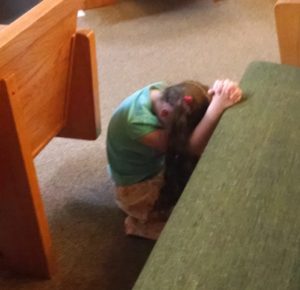
Have you ever had the question, “Why?” asked you multiple times in quick succession? If you have been around children, the answer is likely yes. My children started asking, “Why?” at a very young age. Why do I need to get dressed? Why can’t I have a snack right now? (It was five minutes before a meal.) Why do you tell me what to do? I recall being thankful when sleep overcame the children, and I could stop answering the question, “Why?’ for a few hours. While my children have learned more advanced ways of wording questions, I find that the intent remains the same.
Asking, “Why?” seems to be part of the human experience. Part of the question comes from curiosity and a desire to understand. Almost every invention has sprung from some form of the question, “Why?” It is a question that visionaries and leaders curiously ask in a desire to make things better.

The other part of the question seems to be a challenge to authority. I have observed that when “why” is used this way, the person is trying to ask, “Can I trust you? Are you considering what is best for me?”

When my children were small, there were occasional conversations that ended with, “because I am the dad.” The children did not understand that I was considering their best interests when I had them nap or eat healthy food. They saw me as an oppressive authority to defy. If we find that we are resisting God’s rule, it is time to recognize that He is thinking about our best interests.
Even as I have gotten older, I have never stopped asking why. Usually, I ask because I want to understand. Occasionally, I ask because I am trying to avoid some new thing that is about to be added to my schedule. Asking the question, “Why?” is healthy as long as you do not do it to be defiant or obnoxious.
I cannot find any scripture where God forbids or even discourages us from asking, “Why?” God is not looking for robotic obedience. He desires willing obedience. Often, we have to understand, at least to some degree, to take action; therefore, we ask, “Why?”
God understands that as humans, we are curious and often will supply the answer to why before we ask. Think of Noah. When he received instruction from God to build the ark, God prefaced the direction with the explanation, answering, “Why?” (Genesis 6:13-14) Usually, understanding the reason behind a request makes it easier to comply with the demand. Comprehending the rationale does not mean that the task will be easy; it just means that it can be logically understood. In Noah’s case, God was clear. Destruction was coming to the earth, and obedience would bring salvation, a logical reason why.
When God gave the Ten Commandments, it seems that the “why” was primarily to enable the people to live in God’s shadow. The secondary “why” appears to be to create a society where people lived in peace with each other. (Exodus 20:1-17) If each of the Ten Commandments were fully practiced by every person today, most, if not all, crime would disappear from society.
I wish I could say that God prefaces all instructions with the answer as to why, but he does not. Abraham received a directive from God to go to a distant mountain and there to sacrifice his son Isaac. You can read the story in Genesis 22. God did not give the reason for the command until Abraham had proven that he was obeying. Just before Abraham sacrificed Isaac, God stopped Abraham and provided an alternate sacrifice. When it was all over, God then revealed the “why.” This test answered the question, “Does Abraham trust God enough to obey completely?”
I wonder why I do not follow Abraham’s example. The faith that Abraham exhibited through his obedience is a challenge to me. It also causes me to ask questions like, “Why do I not grasp every promise in scripture? Why do I feel the need to restrict the scope and reach of these assurances instead of taking them literally?” The curiosity of the question, “Why?” excites me. How much fuller could life be? Why am I allowing myself to hold back from fully living in God’s shadow, and what is holding me back? Why does what anyone thinks, what society says, or even what my church says, prevent me from trusting in God completely? Why does it seem such a scary thing to allow God to guide me in planning? Why do I live like I doubt the words of Jesus Christ?

Perhaps the reason we ask God, “Why?” so often is that experience has taught us that we cannot trust ourselves. It is common for individuals to project the perception they have of themselves onto others. The idea that humans project their opinions onto God is not an unlikely scenario. The difference is that God never breaks our trust. We may fail to meet expectations with each other and even with ourselves, but God is always faithful. While we may question why God trusts us, we never need to wonder whether we can trust God. We know that God’s goal is to enable us to live in His shadow and enjoy His presence.

I do still ask, “Why?” I remain curious and sometimes hesitant. I know that I am not perfect. I find comfort in the words of the Apostle Paul. He said, “Not that I have already obtained all this, or have already arrived at my goal, but I press on to take hold of that for which Christ Jesus took hold of me.” Philippians 3:12 (NIV) Living close to God places us in His care whether we understand the reason for what we are experiencing.
Living in God’s shadow is not an exercise in never asking why. It is a willingness to obey whether the “why” is explained to us or not.







